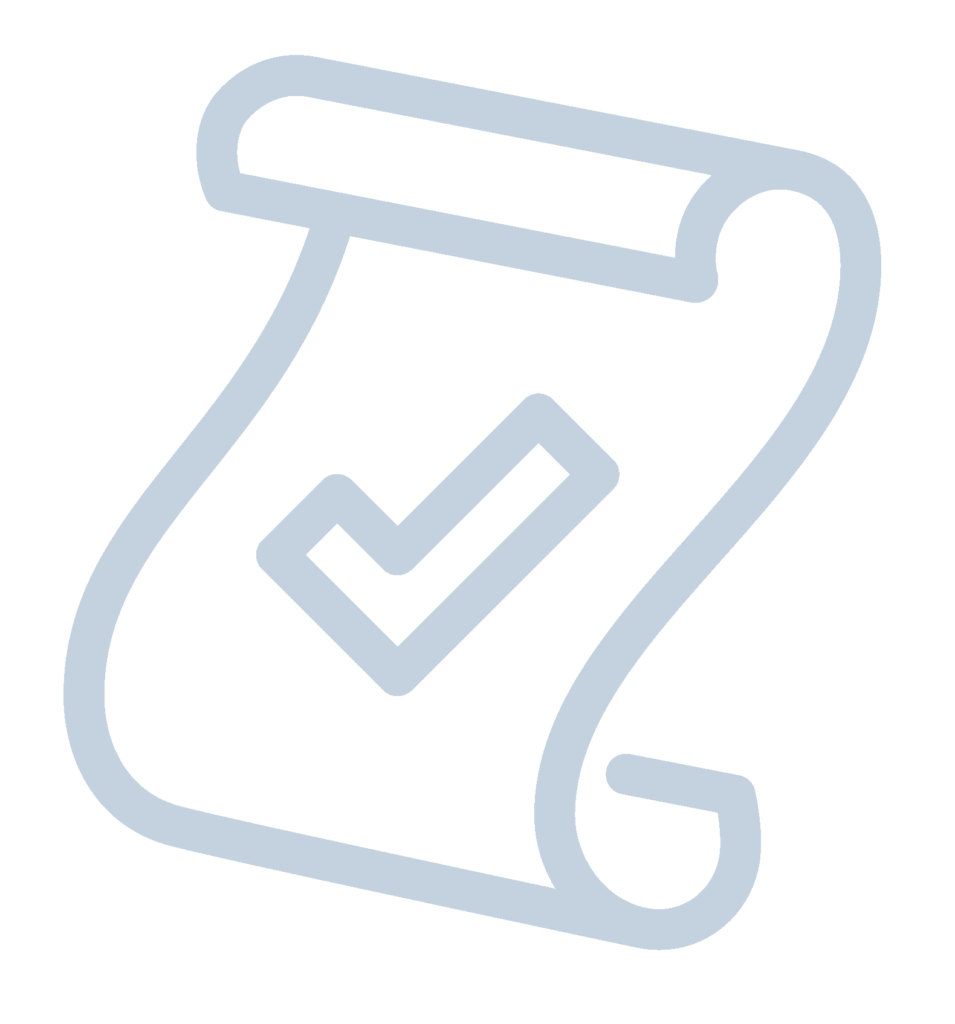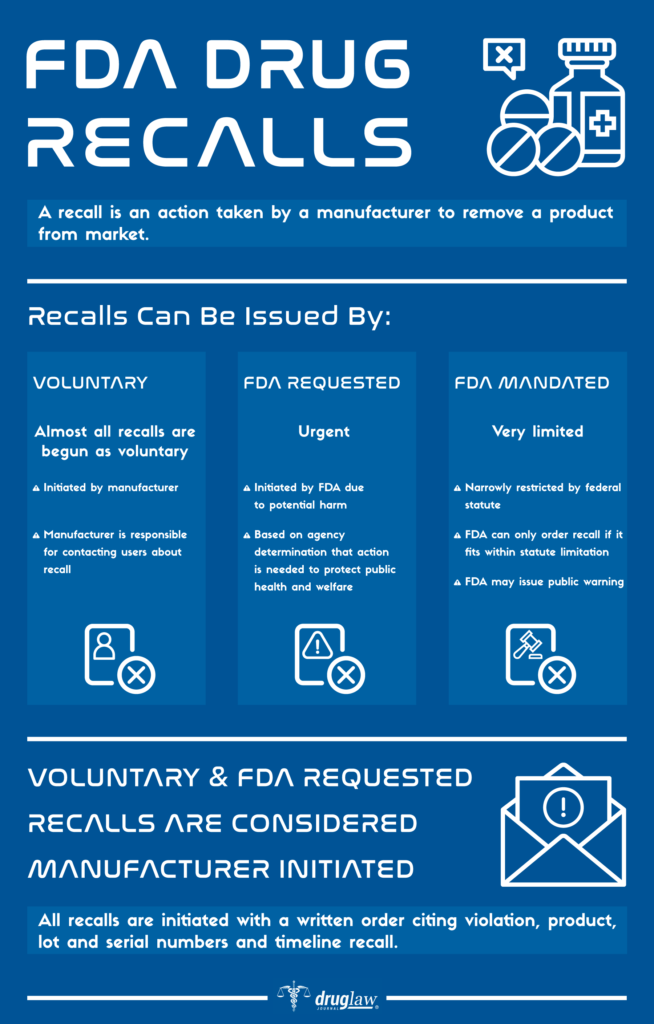
The Food and Drug Administration (FDA) is charged with ensuring that a range of consumer products, like drugs, vaccines and medical devices, are safe and effective. However, most patients and consumers probably don’t realize that for the most part, the FDA is relying upon manufacturers to conduct their own tests and studies for later review by the agency. And then once the drug or device is out on the market, the FDA further relies upon manufacturers to conduct post-market review and report any issues back to the FDA, which could then initiate the need for an FDA Recall.
Sometimes the FDA and manufacturers will conclude that an approved drug or device is, in fact, not safe for use or consumption and needs to be removed from the market. The mechanism for doing so is called a “recall” and the level and depth of the FDA’s involvement in the recall depends a great deal on communication and cooperation with manufacturers who are sometimes reluctant to pull drugs and devices which are huge profit centers for them.
What Is Involved in an FDA Recall?
Typically, if a drug or device manufacturer or the FDA itself, decides that a device or drug is not safe and therefore should not be available to patients and consumers in the marketplace, a recall will be issued. More often than not, the reasons for a recall can range from:
- The drug or device causes dangerous side effects.
- Consumers have used the drug improperly causing serious injury or death;
- The FDA has discovered a safer alternative to the drug or device.
Different types of recalls can be issued based upon the relative danger of illness or harm posed by the drug or device:
| Type of Recall | Scope |
| Class I Recall | There is a reasonable probabilty that a consumer’s use of or exposure to a drug or device will cause serious health problems or death. |
| Class II Recall | Use of or exposure to a drug or device may cause temporary or medically reversible health problems, or there is a remote risk that the drug or device will cause serious health problems. |
| Class III Recall | Use of or exposure to a drug or device is not likely to cause adverse health consequences. |
| Market Withdrawal | The drug has a minor problem that the FDA would not normally monitor. For example, the manufacturer removes a drug from the market because of after-market tampering vs. a problem with the drug itself. |
| Medical Device Safety Alert | A medical device has an unreasonable risk of causing substantial harm. |
Who Issues a Recall?

There are three routes to triggering a recall:
1) The Manufacturer
It identifies the issue internally and then initiates the recall process. This is, in fact, the most common type of recall.
2) Voluntary Recall
The FDA informs a manufacturer that its product is defective and suggests or requests that the manufacturer recall the product.
3) Mandatory Recall
If a manufacturer refuses to recall a product, the FDA has regulatory authority to either seize a product or ask the courts to force the manufacturer to recall the product.
Once a manufacturer begins the drug recall process, it must notify the FDA and then follow-up with progress reports on the success of the recall. If the FDA issues a mandatory recall order, the manufacturer will usually comply. Rarely has the FDA used its powers to seize a drug or device.
How Will I Know if a Drug or Device Has Been Recalled?
The FDA and manufacturers have several routes with which to notify consumers and patients about product recalls. Most notably:
- Direct Notification: Manufacturers affirmatively telling the wholesalers, doctors and pharmacists in its retail supply chain about the recall and what to do with the product.
- Public Notification: The FDA reports on its Class I safety recalls routinely on its web site: “Recalls, Market Withdrawals and Safety Alerts”. Typically Class II and Class III recalls can be found in the FDA’s regularly published enforcement alerts.
- Media Notice: Popular and widely used drugs and devices which are recalled will usually attract a great deal of media attention.
What Are the More Noteworthy and Recent FDA Recalls?
| Product | Recall Date | Reason |
| Zantac (ranitidine) | 2020 | Concern over contamination by NDMA, a probable human carcinogen. |
| Bextra (valdecoxib) | 2005 | Concern over increased risk of heart attack and stroke in patients. |
| Eliquis (apixaban) | 2017 | Concern over a packaging error that mis-labeled the dosage. |
| Vioxx (rofecoxib) | 2005 | Concerns over increased risk of heart attack and stroke in patients. |
| DePuy Knee | 2010 | Concerns over high failure and replacement rate as well as functionality of the design. |
Sources Cited (14)
1) “What Is a Medical Device Recall?” https://www.fda.gov/medical-devices/medical-device-recalls/what-medical-device-recall
2) “Recalls, Corrections and Removals (Devices)” https://www.fda.gov/medical-devices/postmarket-requirements-devices/recalls-corrections-and-removals-devices
3) “Drug recall: An incubus for pharmaceutical companies and most serious drug recall of history” https://www.ncbi.nlm.nih.gov/pmc/articles/PMC4286830/
4) “The World’s Biggest Medical Device Recalls” https://www.medicaldevice-network.com/features/biggest-medical-device-recalls/
5) “FDA Regulatory Procedures Manual” https://www.fda.gov/media/71814/download
6) “Industry Guidance for Recalls” https://www.fda.gov/safety/recalls-market-withdrawals-safety-alerts/industry-guidance-recalls
7) “Characteristics of FDA drug recalls: A 30-month analysis.” https://www.ncbi.nlm.nih.gov/pubmed/26843501
8) “FDA 101: Product Recalls” https://www.fda.gov/consumers/consumer-updates/fda-101-product-recalls
9) “FDA Drug Recalls” https://www.nolo.com/legal-encyclopedia/fda-drug-recalls-32997.html
10) “Study Reveals Most Common Reasons for FDA Recalls” https://www.empr.com/uncategorized/study-reveals-most-common-reasons-for-fda-recalls/
11) “Medical Device Recalls and the FDA Approval Process” Medical Device Recalls and the FDA Approval Process
12) “Critics Assail FDA Medical Device Approval Process” https://www.ncbi.nlm.nih.gov/pmc/articles/PMC3171816/
13) “Drugs and Devices: Comparison of European and U.S. Approval Processes” https://www.sciencedirect.com/science/article/pii/S2452302X16300638
14) “The FDA’s Authority to Recall Products” https://nationalaglawcenter.org/wp-content/uploads/assets/crs/RL34167.pdf
